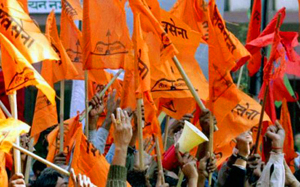Mumbai, Feb 8: Lashing out at the Akhilesh Yadav government over Pakistani ghazal maestro Ghulam Ali's concert in Lucknow, the Shiv Sena today branded Uttar Pradesh as an "Islamic state" and alleged that the state government has begun "anti-national business" for appeasement politics.
The ruling ally also took a swipe at the BJP for being a "mute spectator" to the event, and demanded that those who allowed the concert to take place should be booked for anti-national activities.
"The 'Islamic Yadav' government says that Ghulam Ali was invited to perform to promote Hindu-Muslim unity. But, to promote unity, why does one need Pakistani artistes only? There are fine Muslim artistes in the country who are famous," an editorial in Sena mouthpiece 'Saamana' said.
"Keeping the upcoming Assembly polls in mind, the Yadav government has started an anti-national business (of inviting Pakistani artistes) to play appeasement politics," it alleged.
Lashing out further at the UP government, it said, "Uttar Pradesh is a mine of fine artistes, but (Samajwadi Party president Mulayam Singh) Yadav is only interested in coal from Pakistan," and added that tomorrow Yadav may invite Hafiz Saeed to appease the minority community.
"People who feel that the Pathankot terror attack should be forgotten and Ghulam Ali should be allowed to perform are traitors of the country. If Ghulam Ali is allowed to perform amidst the wails of the family of the martyred jawans, then people responsible (for giving permission to perform) should be booked for anti-national activities," it said.
Taking a jibe at the BJP, the Sena sought to know if the party bagged 71 seats in the UP Lok Sabha polls to remain mute spectator to Ghulam Ali's performance.
"This is bizarre. On one hand ISIS is troubling the Indian government, on the other the Yadavs have turned UP into an Islamic state and welcomed Ghulam Ali," it said.
Ghulam Ali yesterday regaled the audience with his popular numbers on the concluding day of Lucknow Mahotsava.
His performance went off peacefully despite threats by Shiv Sena, which had forced cancellation of his concert in Mumbai last year.





Comments
It is proved that Pakistani's mind-set and tolerance better than Shiv Sena and his followers VHP/BD/RSS, we urge more and more Pakistani Artists come to India to perform these goonda parties shut their mouth and apply Burnol to their backyard.
Shiv seva.. Too much jealously is as if U carry a whole weight of mountain for nothing... Please do take this jealously with U as much as u want and u will find nothing but hatred... which will sunk you deeper & deeper and will not be happy in life....
This is solely the business of UP government.
why others should poke their nose there.
Artists, sportsmen have only 1 religion of their own.
Though they have no religion, at least they are better than who quarrel in the name of religion.
I totally agree with Shiva Sena. Whoever visits Pakistan from India and whoever visits from from Pakistan to India are considered Anti Nationals.
Add new comment